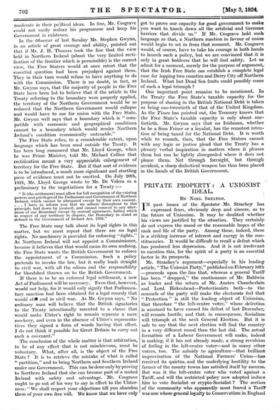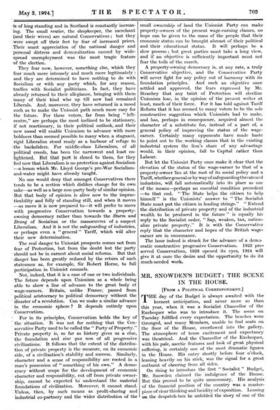PRIVATE PROPERTY : A UNIONIST
IDEAL.
BY NOEL SKELTON.
INpast issues of the Spectator . Mr. Strachey has expressed fears, obviously deep and sincere, as to the future of Unionism. It may be doubted whether his views are justified by the situation. They certainly do not express the mood or- the reasonable hopes of the rank and file of the party. Among these, indeed, there is a striking increase of interest and energy in the con- stituencies. It would be difficult to recall a defeat which has produced less depression. And it is not irrelevant to mention this, for the spirit of a party is an essential factor in its prospects.
Mr. Strachey's argument—especially in his leading article, " The Unionist Party," published on February 16th —proceeds upon the line that, whereas a general Tariff has been " dropped," the continuance of Mr. Baldwin as leader and the return of Mr. Austen Chamberlain and Lord Birkenhead—Protectionists both—to the counsels of the party will- make the electorate feel that " Protection " is still the leading object of Unionism; that therefore " the left-centre voter," whose defection: is assumed to have caused his defeat of last December, will remain hostile, and that, in consequence, Socialism, will triumph at the next General Election. But it is safe to say that the next election will find the country in a very different mood than the last did. The actual formation of a Labour Government will make, indeed is making, if it has not already made, a strong revulsion of feeling in the left-centre voter—and in many other voters, too. The subsidy to agriculture—that brilliant improvization of the National Farmers' Union—has received its quietus, and the underlying hostility to the' farmer of the county towns has satisfied itself by success But was it the left-centre voter who voted against'- a Tariff, and will the restricted' policy now adopted induce him to vote Socialist or crypto-Socialist ? The section of the community who apparently: most feared a Tariff watone-whose general loyalty to Conservatism in England 'is of king standing and in Scotland is constantly increas- ing. The small rentier, the shopkeeper, the merchant (and their wives) are natural Conservatives ; but they were swept off their feet by fear of increased prices. Their scant appreciation of the national danger and ' personal distress and demoralization caused by -wide- 'spread unemployment was the most tragic feature of the election. . • They fear now, however, something else, which they fear much more intensely and much more legitimately : and they are determined to have nothing to do with Socialism or with any party which, for any reason, traffics with Socialist politicians. In fact, they have already returned to their allegiance, bringing with them Many of their kind who up till now had remained Liberals. And, moreover, they have returned in a mood such as to make the Unionist path much more easy for the future. For these voters, far from being " left- centre," are perhaps the most inclined to be stationary, if not reactionary, in their political outlook, and their new mood will enable Unionism to advance with more boldness than seemed possible. to many when a stagnant, rigid Liberalisn stood ready as a harbour of refuge to the backsliders. For middle-class Liberalism, of all 'political creeds, has been the narrowest and least en- lightened. But thilt port is closed to them: for they feel now that Liberalism is no protection against Socialism —a lesSon which Mr. Lloyd. George's pre-War Socialism- and-water might have already taught. - No one would deny that amongst Conservatives there tends to be a section which dislikes change for its own sake—as well as a large non-party body of similar opinion.
But that body of opinion is alive now to the imprac- ticability and folly of standing still, and when it moves —as move it is. now prepared to---it will prefer to move • with progresSive Conservatism towards a property- owning democracy rather than towards the Sturm und Drang of Socialism of the manoeuvres of a suspect Liberalism. And it is not the safeguarding of industries, or perhaps even a " general " Tariff, which will alter their new deteimination.
The real danger to Unionist prospects comes not from fear of Protection, but from the doubt lest the party • should not .be in earnest about social reforms:. But that ' danger has been greatly reduced by the return of such statesmen as, for example, Sir Robert Home, to full participation in Unionist counsels.
Not, indeed, that it is a case of one or two individuals. The future depends upon Unionism as a whole being able to show- a line of advance to the great body of wage-earners. Britain, unlike Fiance; passed from political aristocracy to political democracy without the " disaster of revolution. Can we make a similar advance in the economic sphere ? It depends entirely upon ' Conservatism.
• For in its principles, Conservatism holds the key of the situation. - It was not for nothing that the Con- servative Party used to be called the " Party of Property."
Private property is, so far as history gives us a clue, the foundation and sine qua non of all progressive civilizations. It folloWs that the extent -of the distribu- tion of private property is the measure, on its economic side, of a civilization's stability and success. Similarly, character and a sense of responsibility are rooted in a man's possession of " something of his own." A demo- cracy without scope for the development of economic character and responsibility, cut off from private owner- ship, cannot be expected to undentand the material 'foundations of civilization. Moreover, it cannot stand. 'Unless, then, by such means as profit-sharing -and . industrial co-partnery and the wider distribution of the small ownership of land the Unionist Party can make property-owners of the present wage-earning classes, no hope can be given to the mass of the people that their economic status can be brought abreast of their political and their educational status. It will perhaps be a slow process ; but great parties must take a long view, and if an objective is sufficiently important must not fear the toils of the march.
A property-owning democracy is, at any rate, a truly Conservative objective, and the Conservative Party will never fight for any policy out of harmony with its foundation principles. And such an objective once settled, and approved, the fears expressed by Mr.
Strachey that any taint of Protection will sterilize Unionism lose, in the opinion of the present writer at least, much of their force. For it has told against Tariff Reform that it has seemed to many voters to be the sole constructive suggestion which Unionists had to make, and has, perhaps in consequence, acquired almost the character of a substitute for, instead of a part of, a general policy of improving the status of the wage- earner. Certainly many opponents have made haste to point out to the working classes that in the existing industrial system the lion's share of any advantage would, in their opinion, fall to Capital rather than Labour.
But let the Unionist Party once make it clear that the elevation of the status of the wage-earner to that of a property-owner lies at the root of its social policy and a Tariff, whether general or by way of safeguarding threatened industries, will fall automatically into its place as one of the means—perhaps an essential condition precedent —to that end. "The State helps the citizen to help himself " is the Unionists' answer to " The Socialist State must put the citizen in leading strings." " Extend the distribution of private property and of the industrial wealth to be produced in the future " is equally his reply to the Socialist order, " Sap, weaken, tax, nation- alize private property." It is with the Conservative reply that the character and hopes of the British wage- earner are in consonance.
The hour indeed is struck for the advance of a demo- cratic constructive progressive Conservatism. 1922 pre- served Conservatism, 1928 opened its eyes, 1924 will give it at once the desire and the opportunity to do its much-needed work.















































 Previous page
Previous page